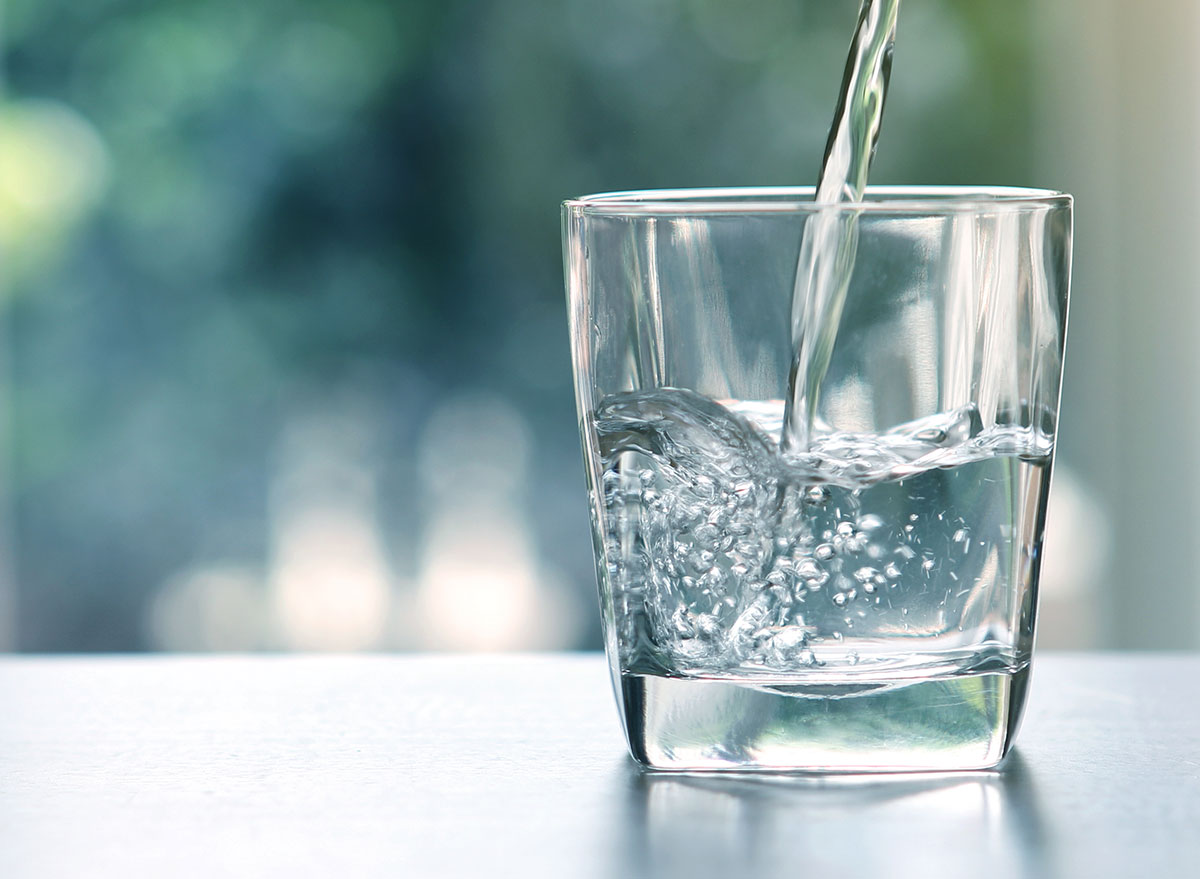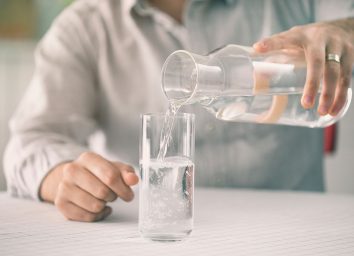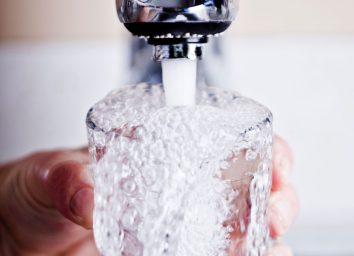Yes, You Can Drink Too Much Water—Here’s What It Does to Your Body

We all know that drinking water is essential to survival, but the question of exactly how much we should consume on a daily basis is something that, well, feels like it will forever go unanswered. That said, we often find ourselves with a full canteen (on constant refill!) next to us to ensure hydration all day long considering the notion that we should drink plenty of water is essentially stuck in our heads at this point. But what if we told you that you can actually drink too much water and it could have a negative effect on your body?
That said, we checked in with Toby Smithson, MS, RDN, CDE, of DiabetesEveryDay and author of Diabetes Meal Planning and Nutrition to learn how much water a person should be drinking, the benefits of making sure you’re drinking enough, but not too much, and the harm that over-drinking water causes.
Here’s everything you should know about water consumption and the advantages, plus disadvantages, associated with drinking too much.
How much water should you drink every day?
Before diving into what drinking too much water does to your body, it’s important to know the ideal amount of water you should be drinking daily. The Institute of Medicine for the Dietary Reference Intakes has created different daily water drinking guidelines for both men and women, with men needing more water than women do on an everyday basis.
Men aged 19–70+ years old require approximately 15.5 cups per day of total water.
“According to the recommendations, the amount of water to drink for men is about 12 cups with three cups coming from other foods and beverages,” Smithson says.
For women, however, the guidelines are a little bit different. Those aged 19-70+ require approximately 11 cups per day of total water. She says, “For women, the recommendations calculate out to nine cups of water plus two cups of fluid coming from food and other beverages.”
Smithson also highlighted the other contributing factors that may alter how much water one should consume, such as physical activity, overall health, pregnancy, weather conditions, and altitude.
“In your diet, consumption of caffeine, alcohol, sodium, protein, carbohydrates, and fiber also needs to be factored into the equation when considering how much water is needed,” she says.
How much water is too much on a daily basis?
So, how much water is too much exactly? When you exceed the amount of fluid that your kidneys can’t excrete through urine that’s when things can get complicated, Smithson says. According to a 2013 study, our kidneys typically can get rid of 20-28 liters of water a day, which on the low end, is about 84 cups of water daily. However, the kidneys cannot excrete more than one liter per hour, which is why you also should not drink a lot of water in a short period of time.
Ideally, you should not consume more than 0.8-1.0 liters of water (27-33 ounces) per hour.
What does drinking too much water do to your body?
It may be surprising, but water intoxication actually has a negative effect on the body and is very much a real thing. Here are five disadvantages associated with the overconsumption of H2O.
Lowers your sodium level
Drinking too much water can cause a condition called hyponatremia, which occurs when the body’s sodium level is too low. Because in this case, the body holds on to too much water, it can make the sodium in your body diluted. Hyponatremia can yield symptoms such as nausea, fatigue, headaches, and even confusion.
“It’s important to note that there are other factors that can also cause this condition like the use of some medications or other medical conditions,” Smithson says before pointing out that the condition could be fatal. “If not treated, this could be life-threatening.”
Increases risk for muscle cramps and weakness
Unfortunately, muscle cramping and feeling weak could be a side effect of drinking too much water, especially if over-consuming while exercising.
“This is due to the electrolytes being diluted,” Smithson says. “The imbalance affects your muscle function.”
Increases risk for headaches
According to Mayo Clinic, hyponatremia can lead to uncomfortable headaches (a symptom that is oddly also associated with underconsumption of water).
“When there is an overload of fluid coming into the body, the brain can’t compensate when your cells swell from this extra fluid,” Smithson says.
Can lead to heart problems
A 2016 study shows that fluid overload could have a negative effect on heart health, and could potentially even cause congestive heart failure.
“This is due to high blood pressure from the excess fluid in the bloodstream,” she says. “There’s also a potential of affecting your heart rate by either extreme of slowing down or speeding up.”
Bladder lesions could form
Abnormalities in the bladder such as a lesion, which “can show up as delayed bladder sensations,” have been associated with too much fluid consumption, according to Smithson. A 2017 study also linked higher fluid intake to an increased risk of bladder cancer.
What are the advantages of drinking the daily recommended amount of water?
While we have highlighted the potential risks of drinking too much water, it’s also more than equally as important to note the advantages of consuming the recommended amount of water per day, which contributes to better overall health. For example, water hydrates the body, which improves physical performance and helps you to feel better as a whole.
“Appropriate water consumption helps with keeping our body temperature in normal range, it adds a lubrication for our joints, it helps with eliminating wastes through sweat, bowel movements (and preventing constipation), and urination, and improves cognition and motor function,” Smithson says.
Because water contains zero calories, it helps with reducing calorie intake, especially when you use water in place of a caloric beverage, the CDC points out. That said, drinking a sufficient amount of water has been linked to weight loss, too.
What are the disadvantages of not drinking the daily recommended amount of water?
While there are disadvantages of drinking too much water, there are also disadvantages of not drinking enough water, with many symptoms being the opposite of the ones that come from drinking a sufficient amount of water. Lack of fluid intake can lead to dehydration, headaches, exhaustion, dry skin and mouth, achy joints, digestive issues, increased risk of kidney stones, and more.
All in all, drinking water is extremely beneficial and important to our overall health, so don’t let the chance of water intoxication instill fear or prevent you from consuming the recommended daily amount, especially because how much water you drink is completely in your control. Be conscious of your fluid intake on a daily basis, and do what makes you feel good without overdoing it. It truly doesn’t hurt to always have a water bottle on hand to ensure you’re hydrated at all times!








